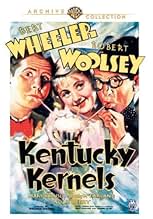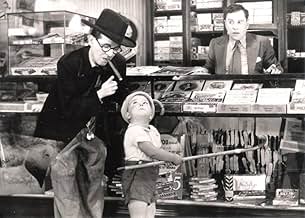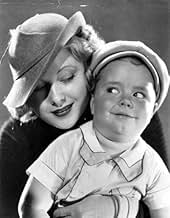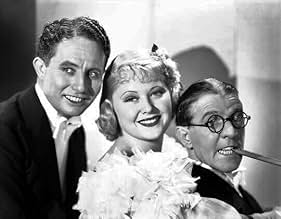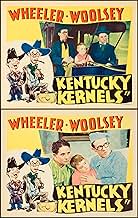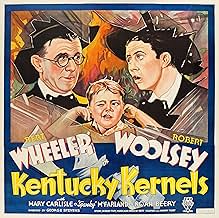Füge eine Handlung in deiner Sprache hinzuTwo out-of-work magicians help lovelorn Jerry adopt little Spanky. When Jerry makes up and elopes, the duo are stuck with the brat. Then Spanky inherits a fortune, so they all head to Kentuc... Alles lesenTwo out-of-work magicians help lovelorn Jerry adopt little Spanky. When Jerry makes up and elopes, the duo are stuck with the brat. Then Spanky inherits a fortune, so they all head to Kentucky and get caught between two feuding clans.Two out-of-work magicians help lovelorn Jerry adopt little Spanky. When Jerry makes up and elopes, the duo are stuck with the brat. Then Spanky inherits a fortune, so they all head to Kentucky and get caught between two feuding clans.
George 'Spanky' McFarland
- Spanky Milford
- (as 'Spanky' McFarland)
Lucille La Verne
- Aunt Hannah Milfor
- (as Lucille LaVerne)
Willie Best
- Buckshot
- (as Sleep 'n' Eat)
Harry Bernard
- Destitute Man
- (Nicht genannt)
Edgar Dearing
- Policeman
- (Nicht genannt)
Jack A. Goodrich
- Double
- (Nicht genannt)
William Gould
- One of the Milfords
- (Nicht genannt)
Dorothy Granger
- Ethel - Baxter's Secretary
- (Nicht genannt)
Empfohlene Bewertungen
Willie Doyle (Bert Wheeler) and Elmer Dugan (Robert Woolsey) are out-of-work magicians. They are The Great Elmer and Company. They help Jerry Bronson adopt Spanky Milford, but Jerry elopes with his girlfriend leaving Spanky behind with the two magicians. Then they are told that Spanky has inherited a large estate. The trio head out to Banesville, Kentucky. At the train station, Willie and fellow passenger Gloria Wakefield (Mary Carlisle) fall for each other. Unbeknownst to the guys, the Milfords and Wakefields are embroiled in a generational blood feud.
Initially, I am amused by Wheeler and Woolsey and the kid. The kid is a bit too bratty and not quite cute enough. The glass breaking is a funny gag at first, but it gets more annoying over time. The guys never really get beyond mildly amusing. I don't hate these guys, but I'm not really laughing either.
Initially, I am amused by Wheeler and Woolsey and the kid. The kid is a bit too bratty and not quite cute enough. The glass breaking is a funny gag at first, but it gets more annoying over time. The guys never really get beyond mildly amusing. I don't hate these guys, but I'm not really laughing either.
Bert Wheeler and Robert Woolsey get themselves stuck with little Spanky McFarland. They're a couple of itinerant magicians and the last thing they need is a kid. But this might be a pot of gold because Spanky just could be the heir of the Milford estate in Kentucky.
But what the boys don't know is that in passing themselves off as Milfords as well, they're inheriting an old mountain feud with another clan called the Wakefields. Made even worse by the fact that poor Bert has fallen for Mary Carlisle the daughter of Wakefield family patriarch Noah Beery, Sr.
The boys are pretty resourceful though and the last twenty minutes or so with them, Willie Best and Spanky holding off a horde of Wakefields is pretty funny. Sad to say though that Willie Best's portrayal of Buckshot probably keeps Kentucky Kernels from having been shown too much on television for years.
Although Kentucky Kernels is funny, I'd see Abbott&Costello's Comin' Round the Mountain. A similar story without the racism.
But what the boys don't know is that in passing themselves off as Milfords as well, they're inheriting an old mountain feud with another clan called the Wakefields. Made even worse by the fact that poor Bert has fallen for Mary Carlisle the daughter of Wakefield family patriarch Noah Beery, Sr.
The boys are pretty resourceful though and the last twenty minutes or so with them, Willie Best and Spanky holding off a horde of Wakefields is pretty funny. Sad to say though that Willie Best's portrayal of Buckshot probably keeps Kentucky Kernels from having been shown too much on television for years.
Although Kentucky Kernels is funny, I'd see Abbott&Costello's Comin' Round the Mountain. A similar story without the racism.
A zany Vaudeville magician & his assistant become KENTUCKY KERNELS when they try to return a small boy to his rightful inheritance down in Plantation Country. What they don't realize is that they're walking right into the hottest feud in the Kentucky Hills...
Wheeler & Woolsey are in top form in this funny comedy (Bert Wheeler is the short guy with curly hair; Robert Woolsey is the fellow with the spectacles & cigar.) Although largely forgotten today, they were often hilarious and always fun to watch. This time they are given powerful support from little Spanky McFarland, of the OUR GANG series, one of the greatest of all child stars. Spanky, with his penchant for glass breaking, fits right in with the goofiness that abounds in all W & W films.
What there is of the plot is simply meant to move the gags along, although opening with an attempted suicide is a bit heavy. The romantics this time - between Wheeler & Mary Carlisle - is particularly thin. Others in the cast are basso villain Noah Beery; elderly Lucille La Verne (memorable a few years later as the voice of the Witch Queen in Disney's SNOW WHITE); and always funny Willie Best, here acting under his nickname of Sleep n' Eat. The monumental Margaret Dumont is given little to do in her few scenes; one longs to see her cast as Woolsey's foil.
The Boys - all of them - sing `One Little Kiss'.
Wheeler & Woolsey are in top form in this funny comedy (Bert Wheeler is the short guy with curly hair; Robert Woolsey is the fellow with the spectacles & cigar.) Although largely forgotten today, they were often hilarious and always fun to watch. This time they are given powerful support from little Spanky McFarland, of the OUR GANG series, one of the greatest of all child stars. Spanky, with his penchant for glass breaking, fits right in with the goofiness that abounds in all W & W films.
What there is of the plot is simply meant to move the gags along, although opening with an attempted suicide is a bit heavy. The romantics this time - between Wheeler & Mary Carlisle - is particularly thin. Others in the cast are basso villain Noah Beery; elderly Lucille La Verne (memorable a few years later as the voice of the Witch Queen in Disney's SNOW WHITE); and always funny Willie Best, here acting under his nickname of Sleep n' Eat. The monumental Margaret Dumont is given little to do in her few scenes; one longs to see her cast as Woolsey's foil.
The Boys - all of them - sing `One Little Kiss'.
Bert Wheeler and Robert Woolsey were one of many comedy teams to make it big during the early sound era. But unlike Laurel and Hardy or the Marx Brothers, their fame has not endured and their movies are not widely available today. Kentucky Kernels is a rare chance to see them at their prime.
The story and screenplay are by Bert Kalmar and Harry Ruby, the same duo who wrote many of the Marx Brothers' early hits, including Animal Crackers and Duck Soup. The fact that Kentucky Kernels features a slightly more conventional brand of humour shows how much of an influence the Marx Brothers had over their appearances. The early Marx Brothers comedies barely had any kind of story at all, because Groucho et al had such wild personalities they overshadowed the logic of plotting. By contrast Wheeler and Woolsey have slightly less exuberant comic personas and are able to work inside someone else's story. This is not a condemnation of the pair, simply an explanation of their difference in style.
Comparisons can be drawn however with other comedians of the era. Robert Woolsey has a little of Groucho in his wisecracking delivery, but also a touch of dour character actor Ned Sparks. Woolsey makes much play of his spectacles and his ever-present cigar, working these props into his aloof, confident comedy creation. Wheeler is more of the straight man, with some of the incompetent and effeminate qualities of Stan Laurel. However he is outwardly normal enough to take the part of a romantic lead in Kentucky Kernels. They are not a bad pairing, although they don't have quite the same dynamic as many of the more famous double acts.
The director for Kentucky Kernels was George Stevens, a graduate from the Hal Roach studios who would later make some very fine pictures. From the rather arty opening shots, it's clear Sevens had a burning desire to be a dramatic director. Stevens, a former cinematographer, had also worked informally as gag-man for Roach and there's no doubt he was a very funny man, but he was never actually that great a comedy director. As he always would, he doesn't stick to wide shots where you can see everything going on, and works a lot in close-up. It's a style that would work very well for him later on, but it doesn't lend itself very well to movies of this sort, as the comedy business becomes too disjointed.
The reason for Wheeler and Woolsey's lack of contemporary fame has been blamed on a number of things, a commonly cited example being their pictures not being reprised on TV in the 50s. However, it seems they weren't exactly phenomenally popular in the first place. Pictures like Kentucky Kernels would do a healthy trade, but they wouldn't get queues round the block. But all comparisons aside, this is still a fairly funny little movie. Our Gang member "Spanky" MacFarland pulls a number of cute and amusing poses. Noah Beery, a hammy version of his brother Wallace, is great fun here. Whether it comes from the writers Ruby and Kalmar, the ideas of cast members or the director, there is a cartoonishness to the humour that keeps things suitably silly. And, even though they may have been a somewhat second-rate pairing, Wheeler and Woolsey are able to provide us with a good many laughs.
The story and screenplay are by Bert Kalmar and Harry Ruby, the same duo who wrote many of the Marx Brothers' early hits, including Animal Crackers and Duck Soup. The fact that Kentucky Kernels features a slightly more conventional brand of humour shows how much of an influence the Marx Brothers had over their appearances. The early Marx Brothers comedies barely had any kind of story at all, because Groucho et al had such wild personalities they overshadowed the logic of plotting. By contrast Wheeler and Woolsey have slightly less exuberant comic personas and are able to work inside someone else's story. This is not a condemnation of the pair, simply an explanation of their difference in style.
Comparisons can be drawn however with other comedians of the era. Robert Woolsey has a little of Groucho in his wisecracking delivery, but also a touch of dour character actor Ned Sparks. Woolsey makes much play of his spectacles and his ever-present cigar, working these props into his aloof, confident comedy creation. Wheeler is more of the straight man, with some of the incompetent and effeminate qualities of Stan Laurel. However he is outwardly normal enough to take the part of a romantic lead in Kentucky Kernels. They are not a bad pairing, although they don't have quite the same dynamic as many of the more famous double acts.
The director for Kentucky Kernels was George Stevens, a graduate from the Hal Roach studios who would later make some very fine pictures. From the rather arty opening shots, it's clear Sevens had a burning desire to be a dramatic director. Stevens, a former cinematographer, had also worked informally as gag-man for Roach and there's no doubt he was a very funny man, but he was never actually that great a comedy director. As he always would, he doesn't stick to wide shots where you can see everything going on, and works a lot in close-up. It's a style that would work very well for him later on, but it doesn't lend itself very well to movies of this sort, as the comedy business becomes too disjointed.
The reason for Wheeler and Woolsey's lack of contemporary fame has been blamed on a number of things, a commonly cited example being their pictures not being reprised on TV in the 50s. However, it seems they weren't exactly phenomenally popular in the first place. Pictures like Kentucky Kernels would do a healthy trade, but they wouldn't get queues round the block. But all comparisons aside, this is still a fairly funny little movie. Our Gang member "Spanky" MacFarland pulls a number of cute and amusing poses. Noah Beery, a hammy version of his brother Wallace, is great fun here. Whether it comes from the writers Ruby and Kalmar, the ideas of cast members or the director, there is a cartoonishness to the humour that keeps things suitably silly. And, even though they may have been a somewhat second-rate pairing, Wheeler and Woolsey are able to provide us with a good many laughs.
Always enjoy Wheeler & Woolsey, even if their movie output is uneven; some are very funny, some are not so. I thought this one was pretty funny and that it succeeds due to the professional direction of George Stevens.
It is old-fashioned in that much of the humor consists of what must be old corny vaudeville jokes, sight gags and outrageous puns, all of which might not go over with today's audiences. Speaking for myself I can appreciate such antiquated antics, and I can also put into context outdated racial humor, such as found here in Willie Best's character. He plays his usual slow-talking, pop-eyed servant ("feets, do yo' duty!") by which he became famous.
Spanky McFarland was always a cute little kid and doesn't disappoint here. And this maybe the only time Noah Beery,Sr. sings on screen, and takes a turn along with everybody else singing a Kalmar-Ruby song "One Little Kiss", a very tuneful number written for this picture. Some reviewers take issue with the inane plot, about two feuding Kentucky families, but c'mon, folks. It's just a Wheeler & Woolsey comedy; were you expecting Ingmar Bergman?
It is old-fashioned in that much of the humor consists of what must be old corny vaudeville jokes, sight gags and outrageous puns, all of which might not go over with today's audiences. Speaking for myself I can appreciate such antiquated antics, and I can also put into context outdated racial humor, such as found here in Willie Best's character. He plays his usual slow-talking, pop-eyed servant ("feets, do yo' duty!") by which he became famous.
Spanky McFarland was always a cute little kid and doesn't disappoint here. And this maybe the only time Noah Beery,Sr. sings on screen, and takes a turn along with everybody else singing a Kalmar-Ruby song "One Little Kiss", a very tuneful number written for this picture. Some reviewers take issue with the inane plot, about two feuding Kentucky families, but c'mon, folks. It's just a Wheeler & Woolsey comedy; were you expecting Ingmar Bergman?
Wusstest du schon
- Wissenswertes"RKO" borrowed George 'Spanky' McFarland from "Hal Roach Studios" for this film.
- VerbindungenFeatured in Hollywood the Golden Years: The RKO Story: Birth of a Titan (1987)
- SoundtracksOne Little Kiss
(1934) (uncredited)
Written by Bert Kalmar, Harry Ruby
Performed by Bert Wheeler, Noah Beery, George 'Spanky' McFarland,
Robert Woolsey, Mary Carlisle and negro servants
Top-Auswahl
Melde dich zum Bewerten an und greife auf die Watchlist für personalisierte Empfehlungen zu.
Details
- Erscheinungsdatum
- Herkunftsland
- Sprache
- Auch bekannt als
- Kentucky Corn
- Drehorte
- Produktionsfirma
- Weitere beteiligte Unternehmen bei IMDbPro anzeigen
- Laufzeit
- 1 Std. 15 Min.(75 min)
- Farbe
- Seitenverhältnis
- 1.37 : 1
Zu dieser Seite beitragen
Bearbeitung vorschlagen oder fehlenden Inhalt hinzufügen

